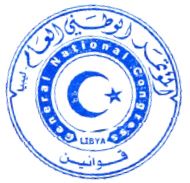With the world’s attention fixated across the Mediterranean on the spiraling Syrian conflict, the efforts of Libya’s elected leaders to rehabilitate their nation have been stung by the poisonous barb of militia power-politics.
On May 5, the popularly-elected General National Congress (GNC) passed the Political Isolation Law, prohibiting former Gaddafi regime members from holding political office over the next ten years. The law reportedly passed with a majority of 164 votes out of 200 total, with only four members rejecting the legislation.

The overwhelming support for the law in the GNC is as much as an illusion as a desert mirage. 10 days prior to the vote on April 28, hundreds of staunchly “revolutionary” militiamen from Misrata and Tripoli’s outskirts entered the capital and laid siege to top government ministries, demanding they be purged of all “Gaddafi loyalists” and refusing to depart until a vote on the Political Isolation Law was held. For days, the Zidan administration stood firm against their demands, while a number of GNC members insisted on holding the vote in eastern Libya, away from the militias’ gun-barrels and armored vehicles.
In an apparent sudden change of heart, the vote was eventually held at the GNC headquarters minutes from Gaddafi’s famed Bab al-Azizyah compound, with congressional spokesmen asserting that, despite the revolutionary sieges, no member was pressured to vote in favor of the law. In a public relations move that fooled few, the militias retreated several hundred meters from their positions around the GNC and other ministries in an attempt to limit outcry of intimidation and legitimize the vote.
For newly revolutionized nations across North Africa, the passage of legislation aimed at limiting previous dictatorial influences is part of a natural process that is often met with broad popular support. Given the dastardly nature of the Gaddafi regime, Libya is no exception. But while news of the law’s passing was met with the familiar sound of celebratory gunfire in Tripoli’s Martyrs’ Square, many Libyans remain fully aware of the dangerously anti-democratic path down which this particular bill could lead.
Indeed, the idea of preventing heinous Gaddafi officials from returning to power has gained broad support from nearly all of the country’s tribes and societal factions. That said, the newly approved isolation bill forced upon the GNC serves to benefit those factions who lost out in Libya’s 2012 general elections. Included in these factions is the Libyan Muslim Brotherhood, whose Justice and Construction Party (JCP) boasts immense popularity in the city of Misrata – and its powerful militia.
Indeed, in contrast to its Egyptian and Tunisian neighbors, Libya gained notoriety during the Arab Spring after the Brotherhood-sponsored JCP failed to outmaneuver a secular rival in popular elections, in this case the National Forces Alliance (NFA) led by Mahmoud Jibril. While only 80 of 200 seats in the GNC are allocated to organized political parties, the NFA eventually succeeded in rallying enough of the 120 independent members to approve the independent Ali Zidan and his largely secular administration.
The passage of the JCP’s political isolation law without amendments places Zidan, GNC President Magarief, and dozens of NFA parliamentarians in the crosshairs of an overzealous Misrata-led (and now legal) crusade to purge the Libyan government of anyone even remotely connected to Gaddafi’s rule between 1969 and 2011. On the streets of Tripoli, this campaign has already begun. Misrata’s militias have reneged on their promise to leave the capital, renewing demands of nothing less than the Zidan government’s ouster.
As an oil-rich nation reeling from the effects of region-wide jihadist militancy, the stakes couldn’t be higher. Since assuming power in October 2012, Zidan has proven himself as a staunch Western ally in the war on terror, as well as someone willing to take immense domestic political risks to rid Libya of tribal instability. At a time of mounting anti-Western sentiment across the region, Zidan has openly called for improving ties with the United States, while actively pursuing security cooperation with France and Britain. Zidan has stood up to heavily armed revolutionaries-turned-
criminals still holed up in Tripoli, using the fledgling Libyan army to sweep the capital of hundreds of renegade militias in recent months. As a former diplomat under the Gaddafi regime, Zidan’s efforts to achieve stability and prosperity are now in danger under the new law, despite his defection in 1980 and subsequent three decades in exile.
Until this point, the Libyan revolution has served to exemplify the positive potential of Western involvement in the Arab Spring, particularly when examining wanton destruction and rising radicalism in Syria. Despite the risks to their own safety, Libya’s anti-militia and pro-democracy voices have already called to mobilize. In the coming days, these activists are expected to take to the streets and confront heavily armed militias to demonstrate to the world their thirst for democracy. With Libya’s stable and prosperous future hanging in the balance, the West can ill-afford to turn a blind eye.